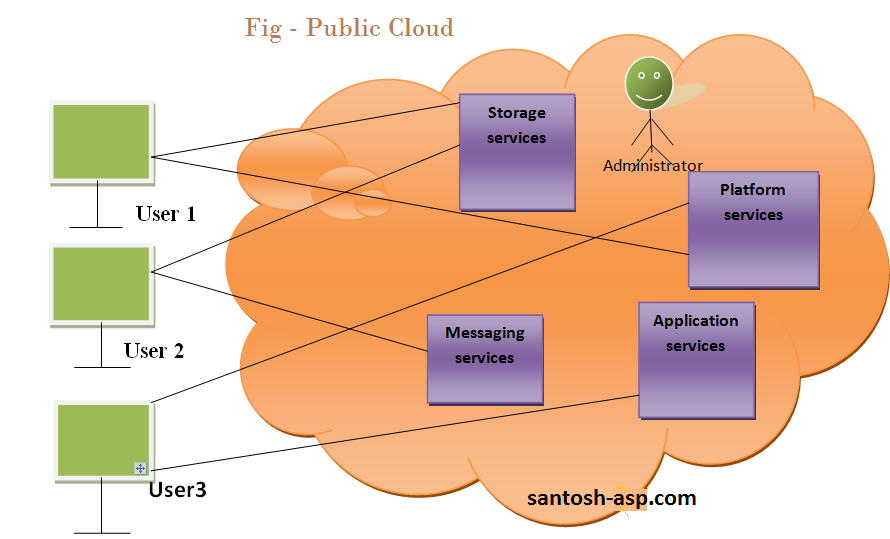Types of Cloud:-
1. Public Cloud:- Public cloud allows the accessibility of systems and services easily to general public. Eg: Amazon, IBM, Microsoft, Google, Rackspace etc.
Public clouds are hosted services available by cloud service providers on the internet. Organizations that use web servers or application systems where security and compliance requirements are not very rigid normally prefer to use public clouds.
For Example:- Public cloud services are available in the form of web based email, data storage or file transfers over the internet, online office applications, web hosting and so on.
Public clouds are most suited for start-ups and small businesses because of minimal set up costs. The resources (servers, storage, etc.) are shared between multiple users publicly and the infrastructure, services and usage policies are managed by the service provider.

Advantages of Public Cloud Model: There are many advantage of Public Cloud
Disadvantages of Public Cloud Model:-
Public clouds are hosted services available by cloud service providers on the internet. Organizations that use web servers or application systems where security and compliance requirements are not very rigid normally prefer to use public clouds.
For Example:- Public cloud services are available in the form of web based email, data storage or file transfers over the internet, online office applications, web hosting and so on.
Public clouds are most suited for start-ups and small businesses because of minimal set up costs. The resources (servers, storage, etc.) are shared between multiple users publicly and the infrastructure, services and usage policies are managed by the service provider.

Advantages of Public Cloud Model: There are many advantage of Public Cloud
- Location Independent: It ensures the independency of location, because public cloud services are delivered through Internet.
- High Scalability: Cloud resources are available as per the demand from the pool of resources that means they can be scaled up or down according to the requirement.
- Flexible: It is very easy to integrate public cloud with private cloud and hence it gives flexible approach to consumers.
- Low Cost:Public cloud is having low cost as compared to private or hybrid cloud, because it shares same resources with large number of consumer.
- Reliable:Public cloud provides large number of resources from different locations, if any of the resource fail, public cloud can employ another one.
- Less Time: The IT resources and services are available immediately saving time for the company.
- No Contracts: No long term commitment with service provider because public clouds are usually pay-as-you-go models.
Disadvantages of Public Cloud Model:-
- Weak on Security: Since the hardware resource is shared between multiple users, IT security issues are more profound and data is vulnerable to thefts.
- Lacks proper controls: The client has no control of data or infrastructure. There are issues of data privacy and integrity. The service level policies and compliances are completely enforced by the service provider.
- Performance: The performance of the network depends on the speed of the internet connectivity.
- Less customizable: It is less customizable than private cloud.